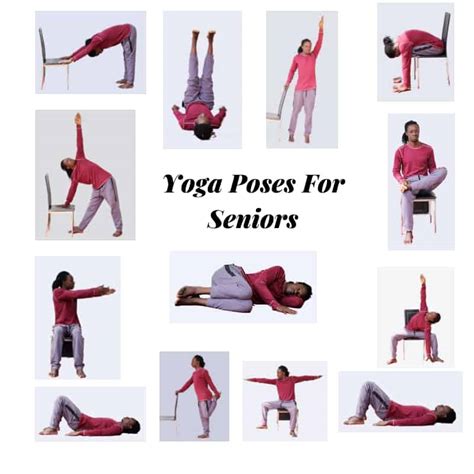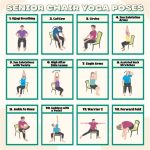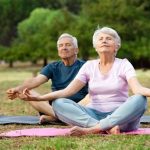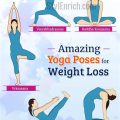Safe and Simple Yoga Practices for Elderly People: A Comprehensive Guide
As people age, maintaining physical fitness becomes increasingly important. Yoga offers a safe and effective way for seniors to improve flexibility, strength, balance, and mental health. However, many seniors are concerned about how to practice yoga safely. This guide outlines simple, beginner-friendly yoga practices for elderly individuals, addressing safety concerns while highlighting the physical and mental benefits of yoga for older adults.
Introduction
Yoga is known for its holistic approach to wellness, combining physical postures (asanas), breathing techniques (pranayama), and meditation. Elderly individuals can especially benefit from yoga, which promotes flexibility, stability, and relaxation. However, not all yoga practices are suitable for seniors, especially those with limited mobility or chronic health conditions. This article explores the safest and most effective yoga practices for older adults, providing practical advice for those new to the discipline.
Key Concepts
- Adaptability: Yoga can be modified to fit the needs of elderly individuals, accommodating physical limitations such as reduced mobility, joint stiffness, and chronic conditions.
- Safety: Practicing yoga safely is essential, particularly for seniors with medical concerns such as osteoporosis or arthritis. Proper modifications ensure a safe and effective workout.
- Breathing techniques: Breathing exercises play a key role in reducing stress and improving lung capacity. Seniors should focus on simple techniques that enhance relaxation and reduce tension.
- Balance and Stability: Yoga enhances balance, an essential factor in reducing the risk of falls, which is a major concern for the elderly.
Historical Context
Yoga has been practiced for thousands of years, but its integration into modern geriatric health is a relatively recent phenomenon. Initially, yoga was seen as a spiritual and physical discipline practiced primarily by younger individuals. However, in the past few decades, yoga’s potential benefits for seniors have been recognized by healthcare professionals, with numerous studies showing its positive impact on elderly health.
Current State Analysis
As of today, yoga has become increasingly popular among elderly populations worldwide. Senior yoga classes are now offered in community centers, gyms, and even healthcare facilities. Many instructors specialize in gentle or chair yoga, specifically designed for those with limited mobility. Research continues to affirm the mental and physical health benefits of yoga for seniors, particularly in reducing anxiety, improving cardiovascular health, and enhancing overall quality of life.
Practical Applications
For seniors looking to incorporate yoga into their daily routines, the following are key factors to consider:
- Chair Yoga: Ideal for those with balance issues or mobility limitations. This involves performing seated yoga postures to stretch and strengthen the body.
- Gentle Yoga: Focuses on slow, controlled movements and poses that are easy on the joints and accessible to seniors.
- Restorative Yoga: A calming practice that uses props like pillows and blankets to support the body, focusing on deep relaxation and gentle stretching.
Case Studies
| Participant | Age | Health Condition | Yoga Practice | Results |
|---|---|---|---|---|
| Margaret | 75 | Arthritis | Chair Yoga | Improved flexibility and reduced joint pain after 12 weeks |
| John | 80 | Osteoporosis | Gentle Yoga | Increased bone density and balance after 6 months |
| Alice | 68 | Anxiety | Restorative Yoga | Reduced stress and improved sleep after 8 weeks |
Stakeholder Analysis
- Seniors: Benefit from improved physical and mental health.
- Yoga Instructors: Need specialized training to accommodate seniors’ unique needs and limitations.
- Healthcare Providers: Encouraged to integrate yoga into treatment plans for elderly patients as part of holistic care.
Implementation Guidelines
To implement a safe and effective yoga routine for seniors, consider the following guidelines:
- Consult a healthcare professional: Before starting a yoga practice, seniors should consult their doctor to ensure it’s safe based on their health condition.
- Use props: Items such as chairs, blocks, and blankets can help support the body during poses and prevent strain.
- Start slow: Seniors should begin with short sessions and gradually increase duration as their strength and flexibility improve.
- Focus on breathing: Incorporating breathing exercises like diaphragmatic breathing can enhance relaxation and oxygen flow.
Ethical Considerations
- Informed consent: Seniors should fully understand the potential risks and benefits of yoga before beginning practice.
- Accessibility: Yoga should be accessible to seniors of all backgrounds, regardless of physical limitations, financial status, or location.
Limitations and Future Research
While yoga has shown great promise for elderly populations, there are limitations. More research is needed to explore the long-term effects of yoga on chronic conditions like Alzheimer’s disease and Parkinson’s disease. Furthermore, studies should focus on developing standardized guidelines for safe yoga practices tailored specifically to older adults.
Expert Commentary
Yoga, when practiced safely, can be a transformative activity for seniors, offering physical, mental, and emotional benefits. Experts agree that the key is proper modification and a focus on safety, which allows even individuals with significant mobility issues to reap the rewards of this ancient practice. As research continues to explore its applications, yoga will likely become an integral part of elderly care plans, enhancing quality of life and promoting long-term wellness.








